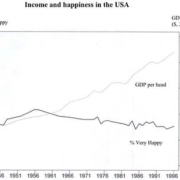Depletion of Moral Capital as a Limit to Growth
by Herman Daly
In the Social Limits to Growth, Fred Hirsh argues that morality of the minimum order necessary for the functioning of a market system was assumed, nearly always implicitly, to be a kind of permanent free good, a natural resource of a non-depleting kind.[1]
Elaborating on the relation of Adam Smith’s Theory of Moral Sentiments to his Wealth of Nations, Hirsh points out that for Smith, men could safely be trusted not to harm the community in pursuing their own self-interest not only because of the invisible hand of competition, but also because of built-in restraints on individual behavior derived from shared morals, religion, custom, and education. The problem that Hirsh sees is that continuation of the growth process itself rests on certain preconditions that its own success has jeopardized through its individualistic ethos. Economic growth undermines its social foundations.[2]
The undermining of moral restraint has sources on both the demand and supply sides of the market for commodities. In his essay, “The Growth of Affluence and the Decline of Welfare,” E.J. Mishan has noted that “a society in which ‘anything goes’ is ipso facto, a society in which anything sells.”[3]
A corollary is that self-restraint or abstinence in the interests of any higher claims than immediate gratification by consumption is bad for sales, is therefore bad for production, employment, tax receipts, and everything else. The growth economy cannot grow unless it can sell. The idea that something should not be bought because it is frivolous, degrading, tawdry, or immoral is subversive to the growth imperative. If demand is to be sufficient for continual growth then everything must sell, which requires that “anything goes.”

Just as science-based technology has fostered “scientism” and increased our technological prowess, it erases moral restraint in economic life. (Image: CC0, Credit: Flickr).
On the supply side, the success of science-based technology has fostered the pseudo-religion of “scientism,” i.e., the elevation of the deterministic, materialistic, mechanistic, and reductionistic research program of science to the status of an ultimate World View. Undeniably, the methodological approach of scientific materialism has led to great increases in our technological prowess. Its practical success argues for its promotion from working hypothesis or research program to World View. But a World View of scientific materialism leaves no room for purpose, for good and evil, for better and worse states of the world. It erodes morality in general and moral restraint in economic life in particular. As power has increased, purpose has shrunk.
The baleful consequence of this fragmenting of the moral order, which we are depleting just as surely as we are wrecking the ecological order, is, as Mishan points out, that effective argument [about policy] becomes impossible if there is no longer a common set of ultimate values or beliefs to which appeal can be made in the endeavor to persuade others.[4]
Just as all research in the physical sciences must dogmatically assume the existence of objective order in the physical world, so must research in the policy sciences dogmatically assume the existence of objective value in the moral world. Policy must be aimed at moving the world toward a better state of affairs or else it is senseless. If “better” and “worse” have no objective meaning, then policy can only be arbitrary and capricious. C.S. Lewis forcefully stated this fundamental truth: “A dogmatic belief in objective value is necessary to the very idea of a rule which is not tyranny or an obedience which is not slavery.”[5]
Likewise, Mishan claims that a moral consensus that is to be enduring and effective is the product of a belief only in its divine origin.[6]
In other words, an enduring ethic must be more than a social convention. It must have some objective, transcendental authority, regardless of whether one calls that authority “God,” or “the Force,” or whatever. All attempts to treat moral value as entirely a part of nature to be manipulated and programmed by psychology or genetics only ends in a logical circularity.
Moral value cannot be reduced to or explained as a mere result of genetic chance and natural selection, without at the same time losing its authority. Even if we knew how to remake moral values as human artifacts, we must still have a criterion for deciding which values should be emphasized and which stifled in the new order. But if that necessary criterion is itself an artifact of humanly manipulated mutation and selection, then it too is a candidate for being remade. There is nowhere to stand.
Once the false belief spreads (and it already has) that morality has no basis other than random chance and natural selection under impermanent environmental conditions, then it will have about as much authority and truth claim as the Easter Bunny. In sum, the attitudes of scientific materialism and cultural relativism actively undercut belief in a transcendental basis for objective value, which in turn undercuts moral consensus. Lacking that consensus, there is no longer the “morality of the minimum order necessary for the functioning of a market system” presupposed by Adam Smith and his followers.
Footnotes
[1] Hirsch, F. 1976. Social Limits to Growth. Harvard University Press, Boston, MA.
[2] Hirsch, Social Limits to Growth.
[3] Daly, H. 1980. Economics, Ecology, Ethics: Essays Toward a Steady-State Economy. W.H. Freeman & Company, New York.
[4] Daly, Economics, Ecology, Ethics.
[5] Lewis, C.S. 1943. The Abolition of Man. Oxford University Press, Oxford, England. See page 86.
[6] Daly, Economics, Ecology, Ethics.
 Herman Daly is CASSE Chief Economist, Professor Emeritus (University of Maryland), and past World Bank senior economist.
Herman Daly is CASSE Chief Economist, Professor Emeritus (University of Maryland), and past World Bank senior economist.








Mainstream economics (neoclassical, conservative Austrian) has turned Adam Smith, the moral philosopher, on his head. The Wealth of Nations delights in competitive markets because they can harness individual human self-interest. Whereas for Smith, self-interest was clearly morally problematic, it has become the “good” for mainstream economists. But then mainstream economists are not noted for their knowledge of moral philosophy, or economic history of thought.
While I completely agree that there is a moral problem with our current economic system, this is the first time I’ve found myself disagreeing with something you’ve written Herman. I suspect that your position on “scientism” and “purpose” is disappointingly out of touch with many of your non-supernaturalist readers :-( One does not need to believe in any kind of higher power to feel purpose or perceive the beauty of the ecological order – There has also been a lot of important work done recently into the “science of morality” – here’s a very light and accessible taster thanks to Sam Harris and TED, but please dig deeper: http://www.ted.com/talks/sam_harris_science_can_show_what_s_right
P.S. I suspect that your quotation of C.S. Lewis (a well-known Christian apologetic) as some kind of moral authority will be pretty offensive to many non-Christian (or thinking non-religious) readers
I can’t believe there are no comments to this the most startling and striking post in Dr. Daly’s long lexicography. He’s calling for a submission to God — “objective authority”, “The Force”, transcendental basis for objective value.
I’m surprised that Dr. Daly accedes to this position, because so many advocates for a better, more moral, society have side-stepped the fundamentalist undercurrent of this position, in any number of ways: Etzioni’s core values, arrived at through tuning in to the still, small voice in our hearts (NOT objective value as our receivers for divine transmission, if any, are strikingly imperfect) to the practice of moral dialog, are just one example.
I fear that this tack, whose impulse (if I understand it) is crucially important to the advocacy Daly’s supporters & followers have taken up, needs to be navigated with great care to avoid falling into the “my” vs “your” “objective value” trap, thus making it impossible to arrive at a shared core value that can be the basis for progress TODAY, THIS MONTH, THIS YEAR (which is where we have to start anyway).
Adam Smith assumed that in order that invisible hand works there must be a good moral capital in the system on the whole. If moral capital is diminished and institutions cannot assure enough supply of moral capital to keep markets functioning rationally, then for sure invisible hand will play a perverse game and it will not maximize social welfare. I therefore assume the emergence of this new school of thoughts on growing moral capital for growing the economy.